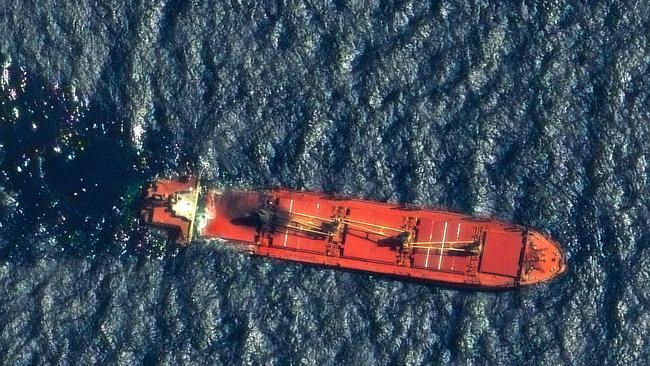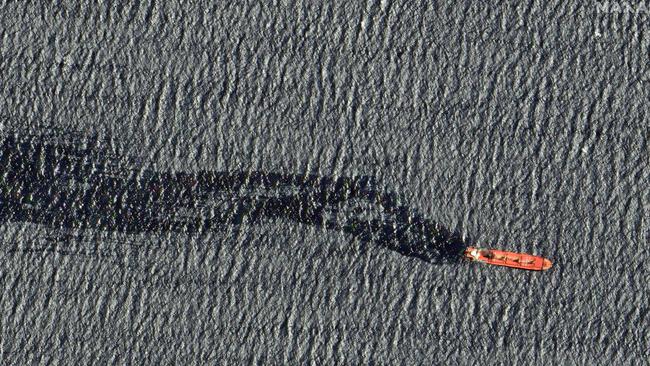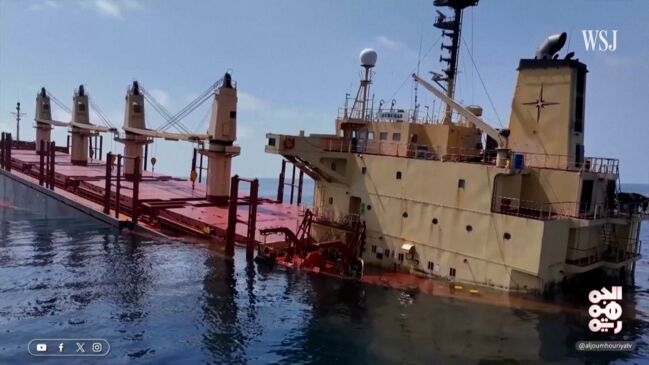British ship Rubymar hit by Houthi missile sinks in Red Sea
The cargo vessel carried fertiliser, threatening the region’s marine ecosystem and, says the Yemen PM, ‘threatens the lives of our people and generations for decades’.

A British-owned ship struck last month by Yemen’s Iran-backed Houthi forces has sunk into the Red Sea, British and Yemen officials said, threatening to cause an environmental disaster with its cargo of fertiliser.
A Houthi missile strike on February 18 had blown a hole in the cargo vessel, Rubymar, which was shipping 22,000 tonnes of Saudi fertiliser to Bulgaria. That evening, the crew abandoned the vessel, flagged in Belize, and it vanished into the sea late Friday after taking on water for two weeks.
The Houthis have carried out more than 60 attacks in the Red Sea region, upending the shipping industry’s ability to travel through one of the world’s busiest commercial waterways, which connects Asia to Europe and beyond through Egypt’s Suez Canal.
The United States and its allies have sent warships to the Red Sea, and the US and the UK have conducted airstrikes against the Houthis in Yemen to deter the group from more attacks on the shipping industry.

But the Houthis have proved resilient, saying they will continue to attack what they say are ships connected to Israel in response to its invasion of Gaza, though many of the vessels have no connection to Israel.
Cleaning up any damage to the Red Sea and its coastal areas from the Rubymar’s fertiliser cargo will be complicated by the continued threat from the Houthis.
“There won’t be anyone to help under missile threat,” said Ami Daniel, chief executive of maritime artificial-intelligence provider Windward.
Even before the Rubymar was lost, the attack on the ship had already caused a 30km oil slick, according to the US Central Command, which is responsible for US military operations in the Middle East.

Roy Khoury, chief executive of Blue Fleet Group, the ship-management company operating the ship in Beirut, said he had been struggling to bring salvaging companies to tow or at least repair it because they were concerned about operating in a war zone.
Ahmed Bin Mubarak, prime minister of the internationally recognised Yemeni government in Aden, which has been engaged in a civil war with the Houthis for a decade, said on X that the environmental disaster caused by the fertiliser cargo sinking “threatens the lives of our people and generations for decades.”
Shell, the giant UK oil company, has suspend all transit though the key waterway over fears of its oil tankers being struck and causing oil spills, The Wall Street Journal has previously reported.
The attack on Rubymar was the worst in the Middle East since 2006, when a suspected attack by Lebanon’s Hezbollah sank an Egyptian ship loaded with cement, said Windward’s Daniel, a former Israeli Navy officer, who witnessed the incident.
The Rubymar was flagged in Belize. Commercial ships are often flagged in offshore jurisdictions, separate from their owners’ headquarters, to benefit from their lax tax, labour and environmental regulations.
The Wall Street Journal


